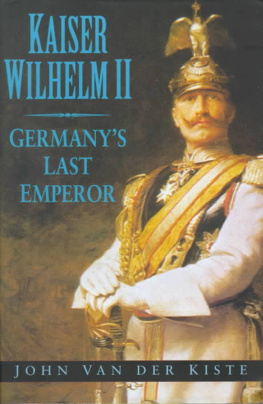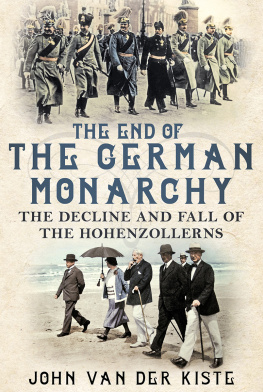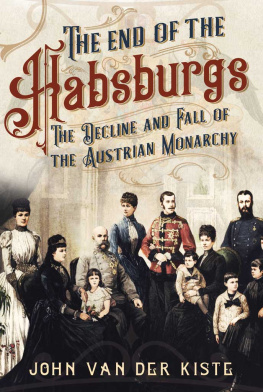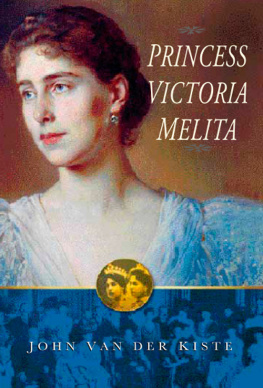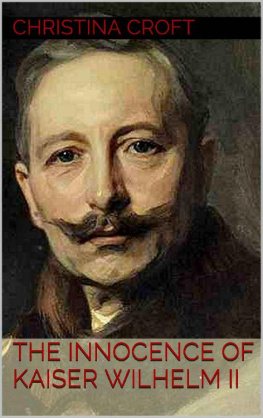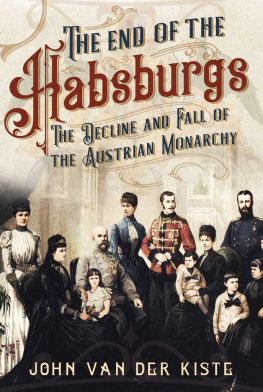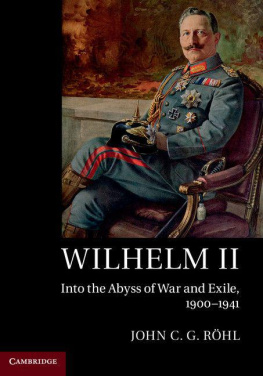John Van der Kiste - Kaiser Wilhelm II: Germanys Last Emperor
Here you can read online John Van der Kiste - Kaiser Wilhelm II: Germanys Last Emperor full text of the book (entire story) in english for free. Download pdf and epub, get meaning, cover and reviews about this ebook. year: 1999, publisher: The History Press, genre: Non-fiction. Description of the work, (preface) as well as reviews are available. Best literature library LitArk.com created for fans of good reading and offers a wide selection of genres:
Romance novel
Science fiction
Adventure
Detective
Science
History
Home and family
Prose
Art
Politics
Computer
Non-fiction
Religion
Business
Children
Humor
Choose a favorite category and find really read worthwhile books. Enjoy immersion in the world of imagination, feel the emotions of the characters or learn something new for yourself, make an fascinating discovery.
- Book:Kaiser Wilhelm II: Germanys Last Emperor
- Author:
- Publisher:The History Press
- Genre:
- Year:1999
- Rating:3 / 5
- Favourites:Add to favourites
- Your mark:
- 60
- 1
- 2
- 3
- 4
- 5
Kaiser Wilhelm II: Germanys Last Emperor: summary, description and annotation
We offer to read an annotation, description, summary or preface (depends on what the author of the book "Kaiser Wilhelm II: Germanys Last Emperor" wrote himself). If you haven't found the necessary information about the book — write in the comments, we will try to find it.
John Van der Kiste: author's other books
Who wrote Kaiser Wilhelm II: Germanys Last Emperor? Find out the surname, the name of the author of the book and a list of all author's works by series.
Kaiser Wilhelm II: Germanys Last Emperor — read online for free the complete book (whole text) full work
Below is the text of the book, divided by pages. System saving the place of the last page read, allows you to conveniently read the book "Kaiser Wilhelm II: Germanys Last Emperor" online for free, without having to search again every time where you left off. Put a bookmark, and you can go to the page where you finished reading at any time.
Font size:
Interval:
Bookmark:
K AISER W ILHELM II
Germanys Last Emperor
Also by John Van der Kiste
Published by Sutton Publishing unless stated otherwise.
Frederick III: German Emperor 1888 (1981)
Queen Victorias Family: a Select Bibliography (Clover, 1982)
Dearest Affie: Alfred, Duke of Edinburgh, Queen Victorias Second Son, 18441900
(with Bee Jordaan) (1984, new edition 1995)
Queen Victorias Children (1986; large print ISIS , 1987)
Windsor and Habsburg: the British and Austrian Reigning Houses 18481922 (1987)
Edward VIIs Children (1989)
Princess Victoria Melita, Grand Duchess Cyril of Russia, 18761936 (1991)
George Vs Children (1991)
George IIIs Children (1992)
Crowns in a Changing World: the British and European Monarchies 190136 (1993)
Kings of the Hellenes: the Greek Kings 18631974 (1994)
Childhood at Court 18191914 (1995)
Northern Crowns: the Kings of Modern Scandinavia (1996)
King George II and Queen Caroline (1997)
The Romanovs 18181959: Alexander II of Russia and his Family (1998)
The Georgian Princesses (2000)
Gilbert & Sulivans Christmas (2000)
K AISER W ILHELM II
Germanys Last Emperor
John Van der Kiste

First published in 1999
Paperback edition first published in 2001
The History Press
The Mill, Brimscombe Port
Stroud, Gloucestershire, GL 5 2 QG
www.thehistorypress.co.uk
This ebook edition first published in 2013
All rights reserved
John Van der Kiste, 1999, 2001, 2013
The right of John Van der Kiste to be identified as the Author of this work has been asserted in accordance with the Copyrights, Designs and Patents Act 1988.
This ebook is copyright material and must not be copied, reproduced, transferred, distributed, leased, licensed or publicly performed or used in any way except as specifically permitted in writing by the publishers, as allowed under the terms and conditions under which it was purchased or as strictly permitted by applicable copyright law. Any unauthorised distribution or use of this text may be a direct infringement of the authors and publishers rights, and those responsible may be liable in law accordingly.
EPUB ISBN 978 0 7524 9928 4
Original typesetting by The History Press
Contents
Preface
Some twenty years ago I wrote my first full-length book, a biography of Kaiser Friedrich III. For several years I had been fascinated by the personality of this enigmatic, little-known, tragic ruler and his wife, Queen Victorias eldest daughter. I was equally intrigued by the personality of their eldest son Wilhelm, Friedrichs successor, and just as much by the different, even contradictory, perceptions of him in almost every book I read. During his reign Wilhelm was spoken of indulgently as the man who wanted to be the bride at every wedding and the corpse at every funeral. One of the shrewdest judges of character of the time, his uncle King Edward VII called him the most brilliant failure in history.
After Wilhelms abdication, the most hated man in Europe, he was later rehabilitated; alongside the demon Hitler, he seemed mild indeed. Nobody, Winston Churchill wrote in an admirably understanding essay in the 1930s, should judge the Kaisers career without asking the question, What should I have done in his position? The future prime minister who was to offer Wilhelm a safe haven in England a few years later saw him as a solitary human figure raised by an accident of birth to be the ruler of a mighty nation, placed far above the status of ordinary mortals.
Was this the full truth about the Kaiser, the ruler who was partly English by birth, sometimes ardently pro-English in his sympathies, yet a personification of Prussian militarism at its worst? Was he just the handicapped child who became an expert shot and horseman, the grandson who adored and revered Queen Victoria though he occasionally made fun of her, the virtuous, God-fearing, faithful husband and devoted father? Or was he the cruel and disloyal son who alternately mocked his mother and accused her of treason; the bisexual philanderer who indulged in illicit liaisons behind his doting wifes back and terrified his sons when he was at home; the warlord who spoke of cutting down his enemies without mercy in speech after speech while seen by his entourage and family as a weak and cowardly figure behind the bombast and bluster?
As a subject for biography he has been well, even indulgently, served by the sympathetic scholarship of Michael Balfour in The Kaiser and his Times (1964). Balfour saw in him a sovereign who claimed to be a leader while in fact he followed others and allowed himself to be moulded by his environment instead of impressing his personality upon it. Instead of blaming him for the catastrophe of the Kaisers war, he asks, should not one blame instead the system which could assign so onerous a post to someone who had so little chance of filling it with credit? The Kaiser was lucky to have such faithful guardians of his reputation, but since then a darker picture has emerged.
By this time the Fischer controversy of 1961 had broken the patriotic self-censorship policy by accepting the significance of the Kriegsrat of December 1912 and thus established beyond reasonable doubt that Germanys aims in the First World War had been broadly similar to those pursued under Hitler, and that she bore a major share of responsibility for causing that earlier conflict. It followed that the central figure at the apex of Wilhelmine Germany, while not the autocrat he fondly imagined himself to be, was himself therefore somewhat responsible. The pendulum of condemnation that pointed the finger at him for being at least partly to blame for starting the Kaisers war, which had moved away from him in a period of impartial reflection, was swinging back. By the 1970s the tougher, more penetrating scholarship of John Rhl, whose recent discovery of other papers, notably the original diaries of three of the Kaisers confidantes, helped to pave the way for a more honest if less kindly portrait of the Kaiser. Count Robert von Zedlitz-Trtschler, the Kaisers court marshal from 1900 to 1912, had published selections from his diary as long ago as 1923. Though the full version has never been discovered, these edited extracts were so damning that one commentator referred to them as the vengeful courtiers spitoon, thus leading one to wonder what had been withheld. The Kaisers head of the naval cabinet, Admiral Georg von Mller, left journals published posthumously in two volumes in 1959 and 1965, but he had doctored them carefully himself in the 1920s and the editor had also prudently removed certain passages from the final edition. Finally Captain Sigurd von Ilsemann, the Kaisers adjutant in exile, left two similar volumes published in German a little later, from which several damning paragraphs were omitted at the request of the Hohenzollern family immediately prior to publication. It always makes me quite ill to hear the Kaiser speak in this manner. What would the judgment of history be if the public were to learn of such talk? read one such entry, referring to an anti-Semitic tirade, for July 1927.
The turning point came in 1977 when Professor Rhl and Nicolaus Sombart jointly directed a seminar at the University of Freiburg on Kaiser Wilhelm II as a Cultural Phenomenon. Two years later Rhl and Sombart and a group of other historians gathered at Corfu to debate and present papers on the Kaiser, his influence on Germanys policies, and his relationship to contemporary German society. No biographer of the Kaiser can fail to acknowledge the great debt to their pioneering studies which resulted from these. As well as Rhls researches, mention must also be made of the magisterial two-volume work by Lamar Cecil of the character whom he calls an exceedingly foolish man, so that to explain and sometimes merely to relate what he did or said reduces a biographer to the greatest perplexity, and of Hannah Pakulas biography of the Empress Frederick, the most detailed and penetrating account yet of this much misunderstood, tragic figure. Significantly, the new primary material in these books, while adding much to our understanding of the Kaiser, reinforces the impression that Balfours and Whittles assessments erred on the side of generosity.
Next pageFont size:
Interval:
Bookmark:
Similar books «Kaiser Wilhelm II: Germanys Last Emperor»
Look at similar books to Kaiser Wilhelm II: Germanys Last Emperor. We have selected literature similar in name and meaning in the hope of providing readers with more options to find new, interesting, not yet read works.
Discussion, reviews of the book Kaiser Wilhelm II: Germanys Last Emperor and just readers' own opinions. Leave your comments, write what you think about the work, its meaning or the main characters. Specify what exactly you liked and what you didn't like, and why you think so.

